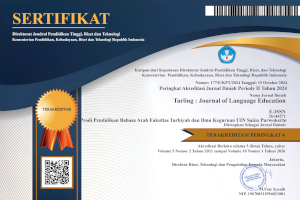Language and Brain Relations and Language Disorders In Arabic Language Learning
Keywords:
Arabic Language Learning, language disorders, neurolinguisticsAbstract
ABSTRACT Communication among humans is facilitated through language, which encompasses both spoken and written expressions organized in a structured manner. Language processing involves different parts of the brain, including areas involved in sound processing, word recognition and linguistic memory. This is important because knowledge of how the brain interacts with language can help in designing more effective teaching methods. Alongside the potential for success, students learning Arabic may also acquire language disorders. The objective of this research is to offer a comprehensive understanding of the relationship between language and the brain in the realm of Arabic language learning, as well as its disorders. The research employs a qualitative approach coupled with a literature study method. Data is gathered from diverse literature sources, including books, journals, and scientific articles that precede the current research. The chosen method for data analysis in this research is the content analysis method. The outcome of this research reveals the existence of language and brain relationships and interference in Arabic language learning through research and tests that have been conducted by previous researchers.Downloads
Published
2024-06-05
Issue
Section
Articles
License
Copyright (c) 2024 Yulyana Dewi Nabilah, Nevin Nismah, Shofil Fikri

This work is licensed under a Creative Commons Attribution-ShareAlike 4.0 International License.
Authors who publish with this journal agree to the following terms:
- Authors retain copyright and grant the journal right of first publication with the work simultaneously licensed under a Creative Commons Attribution License that allows others to share the work with an acknowledgement of the work's authorship and initial publication in this journal.
- Authors are able to enter into separate, additional contractual arrangements for the non-exclusive distribution of the journal's published version of the work (e.g., post it to an institutional repository or publish it in a book), with an acknowledgement of its initial publication in this journal.
- Authors are permitted and encouraged to post their work online (e.g., in institutional repositories or on their website) prior to and during the submission process, as it can lead to productive exchanges, as well as earlier and greater citation of published work (See The Effect of Open Access).










